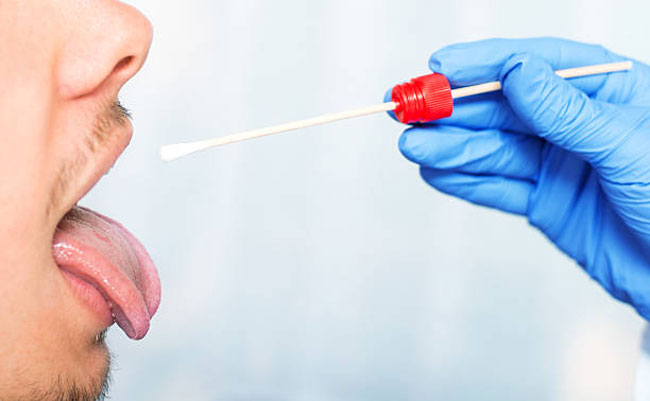Saliva Testing for Hormones
What Can Saliva Testing Detect?
Do you suspect that you may be suffering from a hormonal imbalance?
Finding out may be as easy as taking a simple saliva test.
Many Americans suffer from hormone imbalance disorders. Some may not even be sure what is going on with their body or what the symptoms mean. In order to get a diagnosis and subsequent treatment, it’s important to check with your doctor if you experience any of the following symptoms:
- Hot flashes
- Night sweats
- Irregular periods (in women)
- Indigestion
- Constipation
- Diarrhea
- Vaginal dryness (in women)
- Acne
- Infertility
- Depression
- Anxiety
- Fatigue
- Appetite changes
- Low libido
These symptoms can seriously disrupt your life and affect your moods, your relationships, your sleep, your work, and your overall health. But saliva testing can help determine if you are suffering from an imbalance of hormones and treatment could help you get on with your life.
How does a saliva test compare to a blood test?
Unlike blood tests that require a needle poked through the skin, most saliva tests either involve a cheek swab or spitting into a tube. It is less invasive than a needle and can produce some very powerful results. Saliva tests are considered very reliable when it comes to testing for cortisol and other adrenal hormones.
How exactly does a saliva test work, though?
The adrenal-stress, four-point salivary cortisol test is one of the main tests that is used to determine your hormone levels via saliva testing. Your doctor will collect a saliva sample and send it off to the lab to be tested for cortisol levels. The numbers of the levels will tell your doctor about your adrenal gland functions. From these results, your doctor may be able to tell if you have a hormone imbalance. It is a cost-effective, simple, painless way to check your hormone levels.
Saliva testing is used to assess other hormone levels as well.
Progesterone:
Called the anti-estrogen because it balances estradiol’s effects. It is considered preventive for breast and prostate cancers as well as osteoporosis. In addition, too little progesterone promotes depression, irritability, increased inflammation, irregular menses, breast tenderness, urinary frequency and prostate gland enlargement (BPH).
Testosterone:
An anabolic hormone (builds tissue) that is essential for men and women. The proper level of testosterone is necessary for bone health, muscle strength, stamina, sex drive and performance, heart function and mental focus.
DHEA:
An important adrenal gland hormone, which is essential for energy production and blood sugar balance. DHEA is a precursor to other hormones, mainly testosterone.
Melatonin:
Classified as a hormone but also acting as a neurotransmitter, melatonin is primarily secreted during the dark (at night) with levels dropping dramatically after exposure to bright light. Melatonin is involved with circadian rhythms, and most commonly associated with sleep patterns and sleep disturbances.
Some of the common imbalances identified through hormone testing include estrogen dominance, estrogen deficiency, progesterone deficiency, androgen (testosterone and DHEA) excesses or deficiencies, adrenal dysfunction and adrenal fatigue.
What is adrenal fatigue?
Adrenal fatigue is a syndrome in which you experience uncomfortable symptoms as a result of your adrenal glands not functioning the way that they should. With this syndrome, your adrenal glands are producing fewer hormones than they should be. This can occur as a result of long-term stress. With this syndrome, you may not realize at first that you are sick. In fact, you may feel completely normal and have very few symptoms. This is why people with it may not realize they are sick for a very long time. But if you are using caffeine or other stimulants to get through your day, that may be the first sign that something is amiss.
Cortisol is a very important hormone made by your adrenal glands. Without enough of it, your body cannot maintain proper health. Cortisol is also referred to as the “stress hormone” since our bodies tend to need it when we are mentally or physically stressed. But while this hormone is very important to the function of our bodies, it is not good if we make too much of it. High-stress lifestyles can trigger an overproduction of cortisol which may lead to a deficiency down the road.
Unfortunately, high levels of cortisol for too long can lead to a lot of health problems. Some of these include:
- Sleep problems
- Bone density loss
- High blood pressure
- Lowered cognitive function
- Abnormal thyroid production
- Impaired immunity
- Abdominal fat
Low levels of cortisol can also lead to symptoms such as depression, inflammation, low blood pressure, fatigue, and blood sugar imbalances.
What is the treatment for hormone imbalances such as low or high cortisol?
Reducing stress in your life however you can is a big way to balance your stress hormone levels. Unfortunately, that is easier said than done. Due to the high-stress lifestyle of many adult Americans, sometimes avoiding stress may be extremely difficult. Fortunately, there are still some things that you can do to balance your cortisol levels and better your health.
Eating healthy, exercise, and getting enough sleep at night are all ways you can help balance your cortisol levels. There are also things your provider can do to get you back in balance. In any case, the first thing you should do if you suspect you have a problem is to speak with your doctor. Address all of your concerns and your symptoms and he may recommend a saliva test in order to assess your hormone levels.
Don’t just ignore the effects of high or low cortisol. A simple test can help change your life and keep you on the path of wellness for years to come.
Bonus Information: What can you eat to keep your hormones balanced?
References:
Aging Male, 2006, Sep 9
Clinical Endocrinology, 2007, Nov

